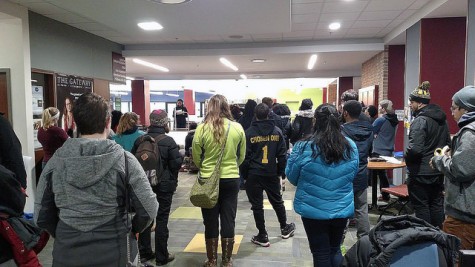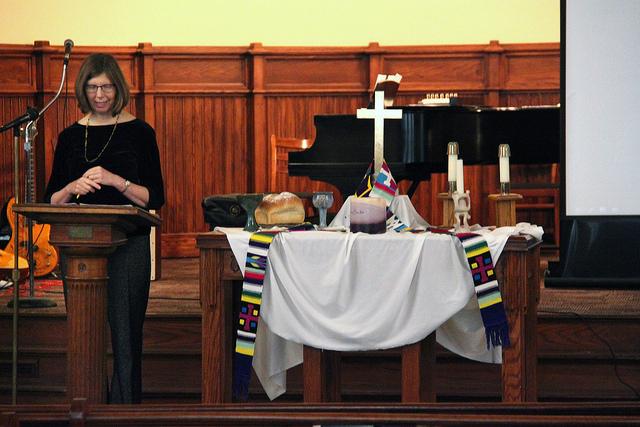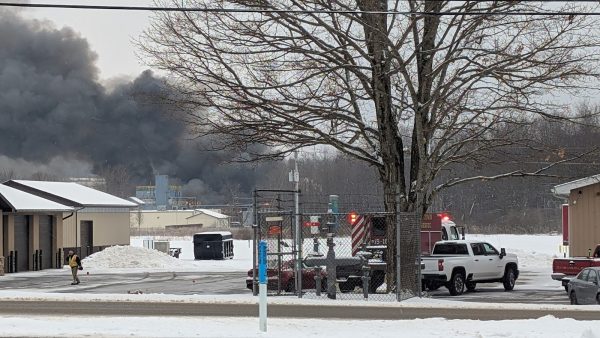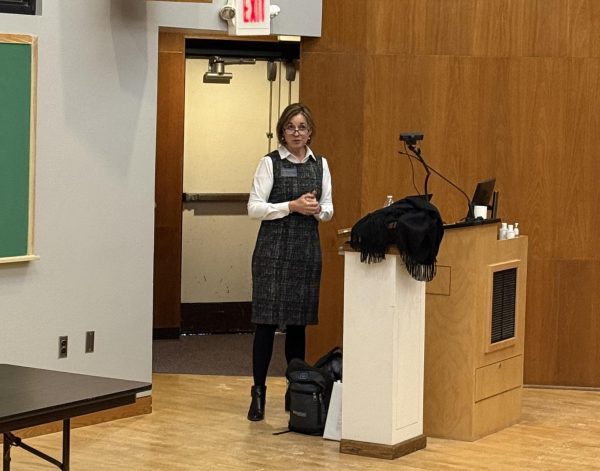MLK celebrations bring diverse groups together
College chaplain Jane Ellen Nickell gives a sermon relating to the teachings of Martin Luther King Jr. in Ford Chapel when Reverend Irene Monroe was not able to come due to in-climate weather on Jan. 24, 2016. The sermon was part of a week-long observance dedicated to the life and activism of King.
Allegheny College hosted several events celebrating Martin Luther King, Jr. Day during the week of Jan. 18, 2016. While past celebrations of the national holiday on campus have consisted of a single day, the college changed how it honored King in 2016.
“I was concerned we just had one day designated for our reflection when clearly the life and work of Dr. King is really significant to our American experience today,” said Marita Gilbert, faculty advisor to the Center for Intercultural Advancement and Student Success.
Gilbert coordinated events for the week, which were sponsored by CIASS.
The college’s celebration of the holiday began before the start of the spring semester with a dinner involving both Meadville community members and Allegheny students at St. Brigid’s Church in Meadville.

Students gathered in the Pelletier Library to wait for assignments for the first Service Saturday of the semester on Jan. 23, 2016. This Service Saturday was held during the week-long celebrations for Martin Luther King Jr. Day.
“It was a great experience because when you looked around the room, it was really diverse, whether you relate that to age, socioeconomic status, race and ethnicity, gender, life experience,” said Gilbert. “That was really impactful for people that went.”
Continuing the celebration, Katrina D. Thompson, associate professor of history and African-American studies at Saint Louis University, delivered a lecture on King’s life and legacy on Monday, Jan. 18.
Celebrations of the holiday continued on Tuesday with a student symposium on the contemporary meaning of King, and how activists can apply his legacy to civil rights work, Gilbert said.
On Wednesday, Jan. 20, the college hosted a student and faculty workshop on community.
Wyatt Boyler, ’17, facilitated this event along with Heather Moore, assistant professor of community and justice studies. Boyler said King’s commitment to community is relevant on Allegheny’s campus.
“Dr. King obviously had a huge commitment to his community, so we wanted to come together as a student body to find something we could commit to,” Boyler said.
Moore said one purpose of celebrating King is to create a starting point for discussions on race.
“In the context of a lot of discussions regarding race on college campuses, specifically last semester, I think that our discussions of Martin Luther King are the foundation of the conversation,” Moore said. “Meaning, there is more that needs to be done.”
King’s speeches and legacy can have a lasting impact today, Boyler said.
“Not everyone understands the substance that King was talking about,” Boyler said. “The substance, the underlying issues that we have in our country that are institutionalized and that need to be sought out.”
Allegheny’s celebration ended with a Service Saturday and a Sunday chapel service focused on unity.
Some faculty saw the college’s celebration as a way to raise awareness to racial issues in the country.
“It’s very easy for many people to remain unaware,” said Michael Mehler, associate professor of theater and co-chair of the Council on Diversity and Equity. “We get focused on our own struggles, which happen even if you have a lot of advantages. It’s important to think about, and to open our minds and our eyes, to what everyone goes through.”
Moore said the conversation on race should continue outside of the college’s celebration of King’s holiday.
“There needs to be more that’s done, so it’s not just that we’re talking about race on Martin Luther King Day and with Martin Luther King events on campus, but that we’re doing it regularly,” she said. “I don’t think that Martin Luther King is it. He’s not the only person that we need to be talking about in regards to justice, human rights and race issues in this country.”
The holiday came at an important time in the national context of discussions on race, Gilbert said.
“We are at a critical moment nationally, thinking about the advancements or lack thereof, especially around communities of difference,” Gilbert said. “Some people will be nervous about that. But I don’t think it’s time to be nervous. It’s time to actually roll up our sleeves and do the work.”
Boyler said it is also important to look forward using King’s legacy.
“We talked about his ‘I Have Been to the Mountaintop’ speech, that he gave the day before he was assassinated,” he said. “He left us on this note, so where do we go from there?”








